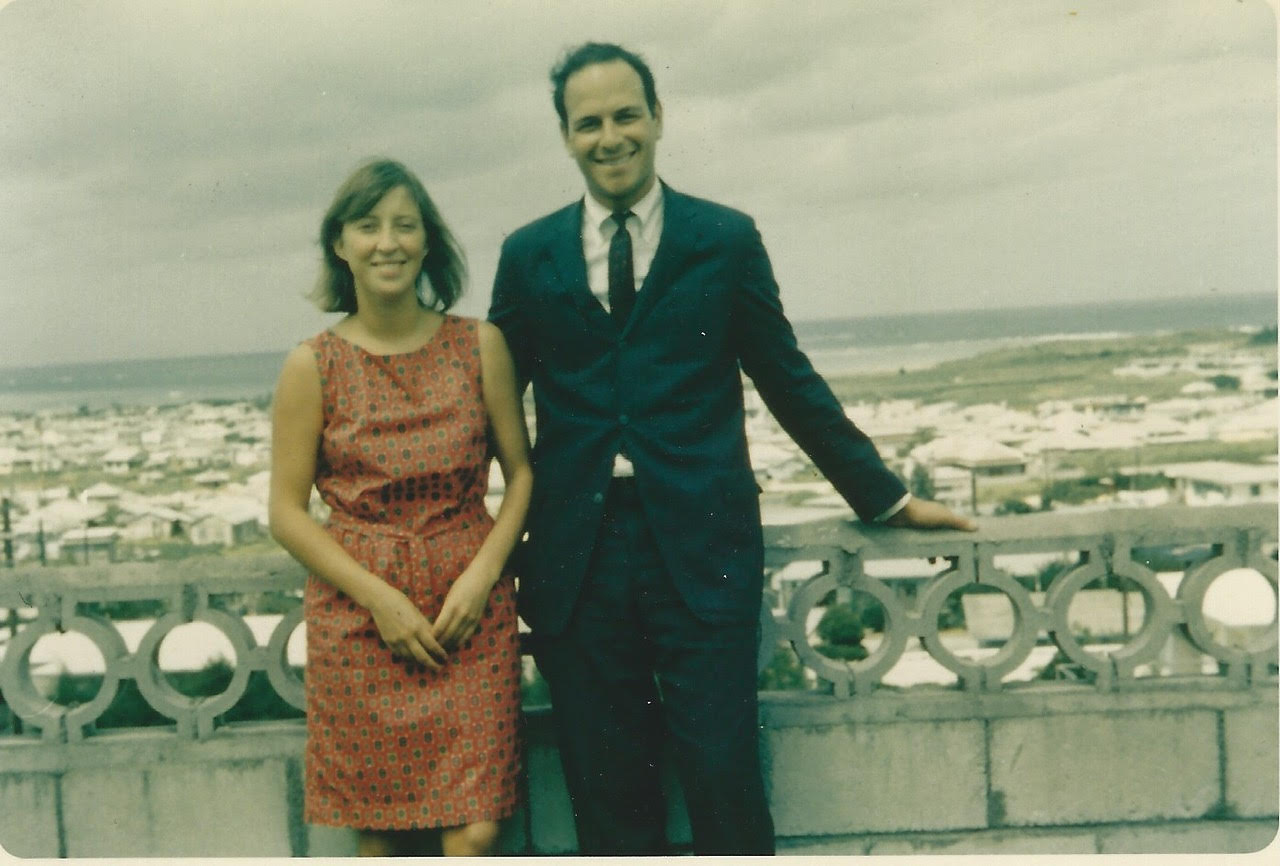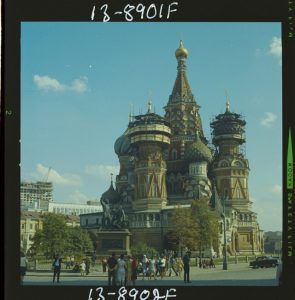Japan and Korea: Delights and Horrors
by Jeffrey Meyers
After completing my two-year appointment at UCLA in 1965 and leaving my year-long English girlfriend there, I had a longing to travel and spent the next year teaching college courses for air force personnel in Okinawa, Japan and Korea. The Far Eastern Division of the University of Maryland had told me that their teachers lived in Bachelor Officers’ Quarters on the military bases and were not allowed to have wives with them, so I bid Valerie a reluctant farewell. Before leaving Travis air base for Tokyo, I discovered that most of the faculty flying out with me were indeed married, had had their wives’ air fares paid and planned to live “in the paddies”: off base and in Japanese housing. I immediately asked Valerie to follow me to the Orient and marry me there. She didn’t need a visa for Japan; and when she called the Japanese consulate in San Francisco to find out if she needed one for Okinawa, she got a furious reply: “Okinawa part of Japan!” She assumed there would be no problem, and didn’t discover till she reached Tokyo that she had to get permission from the American military authorities. The U.S. still controlled access to the island, southwest of Japan and the scene of the last bitter battle of the war in the Pacific.
Valerie was delayed in Tokyo by a fierce typhoon, which also destroyed several improperly secured air force planes on Okinawa and quite a few military careers. After her rough sea voyage from Tokyo to Naha, I met her at the dock and drove her home in an old Pontiac. On the way we stopped to pick up a mattress that was for sale at the side of the road, like many belongings of departing soldiers, and tied the bridal bed to the top of the car.
Our married life got off to a rough start. We had to adjust to the language and culture of Japan and the American military, as well as to each other. Since Valerie was not yet a “civilian dependent” and wasn’t allowed to enter the Base Exchange, I brought out a few simple wedding rings for her to try on in the parking lot. We thought we got married in the Japanese town hall in Naha. After wandering from room to room and window to window, paying a small fee each time, we were finally given a certificate with our names written in katakana symbols, lengthwise down the page. It may have been a permit to open a whorehouse, but was eventually certified by the American consul, Bill Walker. He became a good friend and later served as ambassador during the civil war in El Salvador.
Our spartan but attractive house was perched on a hill overlooking the shimmering East China Sea. Yellow sands from the Gobi desert blew thousands of miles across the Central Asian plateau and landed in our backyard. When mice invaded the house Valerie, with painfully limited Japanese, bought poison in a local shop by lifting her front paws, making little squeaks and then twisting her neck sideways in a deathly grimace. We had horseshoe-shaped family tombs in our garden and the local peasants, worshipping their ancestors and caring for the graves, would take precious water from our garden tap.
Most of the Maryland teachers had not completed their doctorates and had no academic ambitions. Some found it easier to lead homosexual lives in foreign parts. We didn’t have much in common with any of them, and we drove around the island on our own. Once we got north of the military bases and the sordid, whore-stricken town of Koza, the sub-tropical scenery became appealing.
I tried to teach Valerie to drive and play tennis, but we were still too emotional about everything and our lessons usually ended in tears and recriminations. Eventually she got her driver’s license. We did have a good time going to the beach, sailing at the Naval Officers’ Club on the east side of the island and watching the local bullfights. Amidst loud shouting and heavy betting, the powerful beasts, urged on by the handlers who pulled the rings in their noses, tried to push and butt each other out of a narrow circle painted on the sand.
On Thanksgiving weekend we spent our delayed honeymoon visiting two of Valerie’s Cambridge friends who were teaching in Hong Kong. In 1965 the island still had considerable character. We were hauled around in rickshaws, took the cable car up to Victoria Peak and a taxi to the beach at Repulse Bay; saw the lush Botanical Gardens and weird Tiger Balm Gardens, built in the gaudiest Chinese style by a self-made, snake-oil millionaire; took the cheap ferries to the floating markets of Kowloon and to outlying islands where no one spoke English and everyone ate revolting delicacies like fish lips, pig snouts, bear paws and monkey brains. We walked up the steep, narrow alleys where the poorest people lived in cramped medieval squalor, and ate delicious food cooked at the tiny stalls on every street corner. At night the harbor was brilliantly lit up by a display of fireworks.
An English friend had given me an introduction to Simon Keswick, taipan of one of the great merchant families, who invited us to a multi-course dinner in his luxurious hilltop house. His distraught servant, pointing to a broken ventilator, lapsed unintentionally into British slang by lamenting: “Massa have no fanny for one month!” During the lavish dinner, Simon received a mysterious phone call, quietly put down the receiver and, with characteristically stiff upper lip, returned to entertain his guests. We later learned that a close relative had died that night.
We spent the third of four quarters teaching in Tokyo. The move allowed us to see more of the country, but involved another radical adjustment. Life in the capital, with its cold winter, was much more difficult, crowded and expensive than in Okinawa. On arrival, we were shown around by Sugihara, an English teacher with a shaky grasp of the language: “Me angliss teech yeres fife.” Even the school textbooks had crude mistakes that went through many editions. It was considered impolite to correct the professors who’d written them. Sugi, a country boy from the northern island of Hokkaido (home of the hairy Ainu), constantly got lost, which was disheartening as we launched ourselves into the vast, ugly and bewildering city.
In those days there were very few signs in English. The houses were numbered according to the time they were built rather than in their sequential order on the street. Traffic was so nightmarish that we refused an offer of a free car. When we sought out foreign embassies to get visas for our trip home through Asia and Europe, our puzzled taxi drivers had to stop at police stations to find the way.
We had to save half my meager $6,500 salary for our round-the-world journey to America. We were constantly hard up and ate noodle soup in stand-up soba shops while longing for a taste of Kobe beef. We weren’t tempted by the expensive blowfish restaurants, which hung swollen signs outside the premises. Their poisonous specialty could be fatal if not properly prepared.
We inherited from a previous teacher a hideously unattractive, noisy and extremely cold (only one room was heated) house in Higashi Kogenei, on the western edge of Tokyo. It was a “European” style house with a Japanese idea of a bathroom which, like most obenjos, always smelled of blocked drains. When the trucks came to empty the septic tanks, the odor was unbearable. The house was near a public swimming pool—Nakagawa Empu—and next to a school that began the day with martial music blasted on a very loud loudspeaker to accompany the morning exercises. I didn’t get home from teaching till midnight, but the noise woke us up every morning at 8 o’clock. We lived far from the center of the city, but close to Tachikawa air base, where I taught two nights a week. The students were intellectually limited, though eager to learn. The military continued their ludicrous ways by locking my final exams in a safe, losing the combination and forcing me to write them on the blackboard from memory. I was always amused by the strange pronunciation on the armed forces radio station of once-familiar words: “nucular,” “re-la-tor” for realtor and “vé-high-cul” for vehicle.
Our closest neighbors had barking dogs tied up outside their houses and had to be bribed with frozen chickens from the Base Exchange to keep them quiet. I’d knock on their doors, bow politely and hand over the stiff bird, saying: “Inu o shizoku ni sasete, kudasai. Sensei des, benkyo shimas” (You dog making much noises. Me professor and be try to working”). Silence would then descend till it was time for the next humiliating, ineffective bribe. If I needed a taxi, I’d call the local company and say “Rosen-des” (“This is Rosen”—the name of my predecessor). Since we were the only geijin (big-nose foreigners) in the area, they’d drive right over to our house. Most of the time, to save money, I’d walk the frozen mile, past a life-sized wooden bear, to the train station.
My contract stipulated that I’d be picked up and driven to my classes, but twice a week I had to teach at the big naval base at Yokohama and get there on my own. Remembering Sugihara’s permanent confusion, I began life as an Underground Man by descending into the subway and warning Valerie to send a search party if I didn’t reappear in twenty-four hours. I’d take the train to Shinjuku, the main western station; change for Tokyo-eki, the central station; then change again for Yokohama in the south: a ghastly round trip of four to five hours.
The subway was always packed, and the most crowded stations had official pushers with wooden rods who’d jam the passive passengers into the sardine-packed cars. At six feet, one inch, I towered above the other riders and could see the occasional westerner at the far end of the car. I can still remember the names that were called out as we approached the downtown stations: Akasaka Mitsuke, the Italian-sounding Rappongi and the mournful, drawn-out Hiroo. If I got confused and stood staring at a subway map amidst the swarming throng, a tiny student would tug at my sleeve, say “You lost!” and lead me in the right direction.
On the late night trains many red-faced businessmen, after an evening’s jollity, would be quite drunk. Shedding their habitual reserve, they’d embarrass the other passengers by shouting and singing. When one of them left the train, it became a point of honor to get the last farewell bow, and they’d bob up and down at each other like mechanical toys until the doors finally slammed shut. Rosen-des’ tarty wife had outsized breasts. When she hung on to the overhead strap in the rush hour, they were at eyelevel of the average Japanese. One commuter, staring in disbelief, raised his hand to touch them. Amused and unable to move, she nodded her encouragement and he felt her soft cushions to make sure they were real.
During my first cautious trips to restaurants I had to point to dusty plastic replicas of food in the front window or to potentially edible dishes that were on the nearest table. With the help of the ludicrously entitled Japanese in Thirty Days, I learned about 300 words. Though not sufficient for a conversation, they enabled me to order food, go shopping, find my way around and direct the taxis (migi: left, hidari: right). I also learned to appreciate the modest Japanese virtues: cleanliness, politeness and honesty. Pretty girls in neat uniforms would welcome me with a bow as I entered department stores (all the clothes were too small for outsize geijin) and use their white gloves to wipe the handrails of the escalators. If I left a few yen behind when given change, the shopkeeper would run after me to return it.
We saw the golden, sand-raked temples in Kyoto and strolled among the tame deer that wandered through the streets of Nara; went up the mountains to country inns and to the frozen Lake Chuzengi, where it was too cold to stay outside for more than a few minutes. On New Year’s Day we were allowed to enter the grounds of the emperor’s palace and watched fashionable women parading in their best kimonos. The most convivial times were spent with friends in the Igiris Taishkan (British Embassy), where it was a rare pleasure to sit in a comfortable chair in an attractive room and have a real European meal. We repaid our friends’ hospitality by supplying American fashion magazines for visiting royalty and by inviting them for big steak dinners at the officers’ club. While ice-skating with English friends, I hobbled and skidded around as the others glided gracefully on the frozen pond and even took daring little jumps. In a country inn we huddled around the kotatsu, a brazier placed in a sunken area of the floor (and inevitably smelling of burnt socks), and ate grilled wild boar. One of these bristled, long-tusked beasts lay frozen on the sidewalk.
My English friends were much more sophisticated and amusing than my colleagues at Maryland. One evening a diplomat named Merrick challenged me to compose a limerick that rhymed with his difficult name. I’d been reading Arthur Koestler’s The Lotus and the Robot, which described a Hindu holy man lifting heavy objects with his erect penis. Rising, as it were, to the occasion, I wrote:
There once was a young man named Merrick,
Of temperament haughty, choléric,
Who by use of dark arts
Raised great weights with his parts,
A feat that was truly Homeric.
Things got worse and houses smaller as the academic year went on. If Tokyo was unpleasant, Korea was horrible. In early March we flew to Seoul for the spring quarter. The country had a civilian government, but was virtually ruled by the U.S. military authorities. In Japan I noticed many traces of the war and the American occupation, but the country seemed to be reviving its traditional culture, and there were many beautiful and elegant places to see. Korea had been eviscerated by the Japanese, who had occupied the country from 1910 to 1945. Seoul was crawling with soldiers, Korean and American, and there was almost nothing to do or see in the decrepit, depressing city, in which all the rickety buildings seemed about to collapse. Army trucks unloaded their cargoes of raddled whores at the gates of the air base, where the girls, adjusting their falsies, jumped into the street. A curfew was strictly enforced and anyone caught outside after midnight was sentenced to a night in jail. There was always a panicky rush for taxis after eleven o’clock. On one of our mad dashes home, the motor fell through the front of the ancient taxi, the car scraped to a halt and the young woman driver burst into tears.
We had avoided the worst of the winter, but it was still cold and bleak in March. Our dismal street, Han Nam Dong, was filled with mud and washed by open sewage. Korea had no barking dogs: they had all been cooked and eaten. But there was loud noise from street peddlers, knife sharpeners and collectors of old clothes. Our tiny, two-room flat had an obtrusive servant, Mrs. Kim, who was attached to it and spoke to us in pidgin Japanese. If we were in one room, she sat in the other, and we awkwardly shifted places throughout the day. When I returned home from teaching at the end of the week, she’d shake my suit on the hanger to remind Valerie that her oksan (husband) was about to appear. Mrs. Kim (“me Clistian”) was supposed to guard the house against thieves, but she stole our meager rations to feed her sprawling family.
The Koreans were desperately poor, and theft was endemic and ingenious. I had a glove lifted from one hand while writing a check with the other. The thieves cut down American telephone poles, dug up underground cables as soon as they were buried and took sixty television sets from an army base in one night. When they tried to steal from the Turkish soldiers attached to the United Nations forces, the Turks caught one of them, shoved a ramrod through his head from ear to ear and hung him outside the barracks: a formidable deterrent. But constant theft required constant vigilance, and this was a strain.
In Korea I had the most grueling schedule of all. Every week for ten weeks I’d ride three hours by bus to the base at Osan, teach there on Monday and Tuesday nights; fly to Kunsan on the southwest coast, teach there on Wednesday and Thursday nights; and fly back to Seoul on Friday. I either had to accept Maryland’s crude exploitation and broken promises to drive me to the base or (which was impossible) quit the job and pay my own way home. I was ordered to be at the airport in the morning, but had to wait all day for flights that were always late. Though my civilian status equaled a lieutenant-colonel’s, I was always bumped from the planes. I then had to call headquarters and fight my way back onto the plane in order to teach my classes. I had to endure the same tedious process to get back home. Occasionally, I was lucky enough to hitch a ride on a two- or four-seat plane that flew close to the ground and offered a spectacular view of the rivers that wound through the mountainous landscape.
The streets of rural Osan and Kunsan were filled with rotting garbage and rooting pigs. Korean women married to G.I.s would buy large quantities of cheap goods in the base exchange and sell them on the thriving black market. The medical officer at Osan was a veterinarian who, dressed in a blood-stained lab coat and holding a bent hypodermic syringe, inspected the local prostitutes. If he pulled the cards of infected women and prevented them from working, they lured their favorite customers to their homes and gave them the clap. It was sad to see pimply southern teenagers marrying middle-aged whores.
I once took a visiting writer to Panmunjom, on the border of North Korea. Pointless peace negotiations, under the grim gaze of North and South Korean guards, had continued for thirteen years after the war. On the day of our visit, the diplomats argued about the height of the flags on the tables. Back on the bus, we talked and joked hilariously as I relished my first contact that year with a sophisticated and witty American author. Sitting in front of us was a sergeant, whose creased fat neck dropped over the edge of his stiff collar. He turned around angrily and told us to “watch our fuckin’ language” in the presence of his beefy wife.
Nothing is more depressing, as V. S. Naipaul showed in A Bend in the River, than being stuck in a foreign country that you hate. At the end of the year we had a farewell dinner in Tokyo with the University of Maryland teachers, some of whom had Asian wives. A tasteless award—a miniature night-soil bucket that peasant farmers carried to fertilize the fields—was given to the teacher who’d eaten the most shit during the year. I was surprised to find that someone else had it worse than me. The shit bucket symbolized what I thought of my last post: Ass-Seoul in Huntington’s Chorea.
Jeffrey Meyers will publish both James Salter: Pilot, Screenwriter, Novelist and Parallel Lives: From Freud and Hitler to Arbus and Plath with Louisiana State University Press in 2024.






Be First to Comment